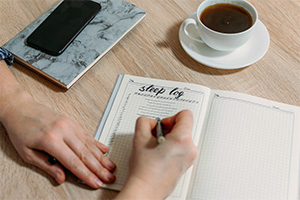
If you or your physician suspects you have sleep apnea, they may recommend creating a sleep diary. It isn’t a place for you to write down your dreams or thoughts from the day. Instead, you’ll be instructed to track key information that can play a role in a sleep apnea diagnosis. Your healthcare team can use the data to reveal potential factors influencing your sleep quality. Here’s how logging your nighttime patterns can lead to a better night’s rest.
What is a Sleep Diary?
You don’t need an actual journal to start your diary. Often, a piece of paper will suffice. Your physician will advise you to keep your log for 1-2 weeks, which should include information about:
- What time did you go to bed?
- How long did it take you to fall asleep?
- Did you wake up during the night?
- How long did you stay awake each time?
- What time did you get up in the morning?
- How well did you sleep?
- Did you take any naps during the day?
- How much caffeine or alcohol did you drink?
- Did you take any prescribed or OTC medications?
- Did you exercise?
How Can a Sleep Diary Help?
You and your physician can learn a lot from your diary, like issues you may not have expected to affect your sleep patterns. For example, your physician might find an inconsistent bedtime routine, or watching TV late at night might be the reason you’re battling daytime fatigue. However, it can also show certain problems, like symptoms of sleep apnea.
The condition causes frequent disruptions in breathing throughout the night. As the soft tissues in the back of the mouth and tongue relax, they can collapse and create an obstruction that can make you stop breathing. Although you may not be aware of the interruptions, information from your diary could show possible symptoms, such as:
- Waking choking or gasping for air
- Waking often to urinate
- Waking with a dry or sore throat
- Waking with a headache
- Not feeling rested in the morning
- Needing to take naps throughout the day
Based on the information gathered, your physician may refer you for a sleep study to confirm the diagnosis.
Treating Sleep Apnea
If you find out you have sleep apnea, you have a couple of options to treat the condition. A CPAP is the most traditional method that uses a machine to deliver a steady stream of air pressure through a mask worn over the nose. However, an oral appliance can be just as effective. The customized device repositions the jaw and tongue to keep the airway open to stop breathing disturbances.
Your sleep diary can help you breathe better and fall asleep quicker to wake up feeling alert and ready to start the day.
About Dr. Dean Hutto
Dr. Hutto achieved his dental degree from the University of Texas Dental School and has pursued higher education in advanced services, like sleep apnea therapy. He specializes in oral appliance therapy. If you’ve been diagnosed with sleep apnea, contact our office today to request your consultation.
